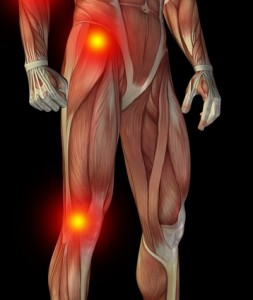
We are continuing our theme this week of exercise and physical activity as the 5×50 worldwide exercise flash-mob challenge starts on Friday 23rd November (see earlier post)
Do you know anyone who is waiting for a knee or hip joint replacement? They typically experience pain, reduced muscle strength and function. So how can they prepare for surgery? A recently published systematic review by a group of Australian authors aimed to investigate the pre-operative effects of exercise-based interventions on pain and physical function for people awaiting joint replacement surgery of the hip or knee.
Here’s what they did
They searched 4 electronic databases to July 2012 for randomized or quasi-randomized studies comparing an exercise-based intervention with a no-intervention group for people awaiting hip or knee joint replacement surgery. One of two reviewers determined that 18 studies met the inclusion criteria. They assessed the methodological quality of each study using the PEDro scale.
Here’s what they found
For participants awaiting knee replacement surgery:
- no significant differences between the exercise and no-intervention groups for pain, self-reported function, walking speed or muscle strength.
For participants awaiting hip replacement surgery:
- a significant difference between the groups with standardized mean differences (SMD) indicating a medium sized effect in favour of exercise for both pain (SMD .45, 95% CI 0.15 to 0.75) and self-reported function (SMD 0.46, 95% CI 0.20 to 0.72).
13 of the 18 studies were considered to have good methodological quality.
The authors concluded
Exercise-based interventions can reduce pain and improve physical function for people awaiting hip replacement surgery but not knee replacement surgery.
The Musculoskeletal Elf’s view
 The participants in the included studies were typically older adults with average ages of between 60 and 80 years and most studies had more females than males. Exercises completed by the intervention groups typically included some form of
The participants in the included studies were typically older adults with average ages of between 60 and 80 years and most studies had more females than males. Exercises completed by the intervention groups typically included some form of
strengthening, flexibility, and aerobic exercise. Interestingly three of the five interventions for people awaiting hip replacement included pool-based exercise programmes whereas there was only one study for those awaiting knee replacement. Education was also included in most programmes.
Because the studies included in this review used different measurement tools, the authors calculated standardized mean differences. This allows the data from different outcome measures to be pooled provided that they are measuring the same domain. SMDs can be interpreted as small (.2), medium (.5), and large (.8). There was significant heterogeneity (variability) in the pooled data for pain, walking speed and strength in studies of those awaiting knee replacements.
I’m just off to check the Elves preoperative programmes for hips and knees.
PS: Don’t forget to sign up for and join the Musculoskeletal Elves Team (on the 5×50 registration website #TheMSK_Elf).
Questions
- Are the participants in these studies similar to the ones you see in your hospital?
- Do you advise patients to exercise in preparation for their surgery?
- What types of exercise programmes do you prescribe? What is the content, frequency, duration and intensity?
Send us your views on this blog and become part of the ever expanding Musculoskeletal Elf community.
Links
- Gill SD, McBurney H. Does exercise reduce pain and improve physical function before hip or knee replacement surgery? A systematic review and metaanalysis of randomized controlled trials. Arch Phys Med Rehabil. 2012 Sep 4. [Epub ahead of print]
- PEDro is the Physiotherapy Evidence Database http://www.pedro.org.au/english/downloads/pedro-scale/


I would concur with the findings from the hip pre-op rehabilitation from my experience. The patient usually suffers many years of pain before the THR and learns an abnormal gait pattern. Following the THR the joint surface is replaced but they continue with an antalgic gait pattern and have shortened/weakened muscles. I think pre op physiotherapy would help reduce shortened structures, reeducate a more normal gait pattern and challenge beliefs about pain. I suspect this type of rehabilitation would also minimise revisions from failed THR.
Thanks for the blog Tracey. I think the review highlights a real challenge for physiotherapists, particularly with respect to people awaiting knee replacement – we need to develop effective interventions. For those that have worked with people awaiting hip and knee replacement you will know that exercise-based interventions can be effective (for some). The challenge ahead is to develop well designed interventions that work for a broader range of participants and then demonstrate the efficacy of these interventions with well designed trials. My feeling is that interventions must recognise that pain and disability can result from a variety of causes, hence interventions need to be multi-dimensional (if not multi-disciplinary). So let’s get to it…